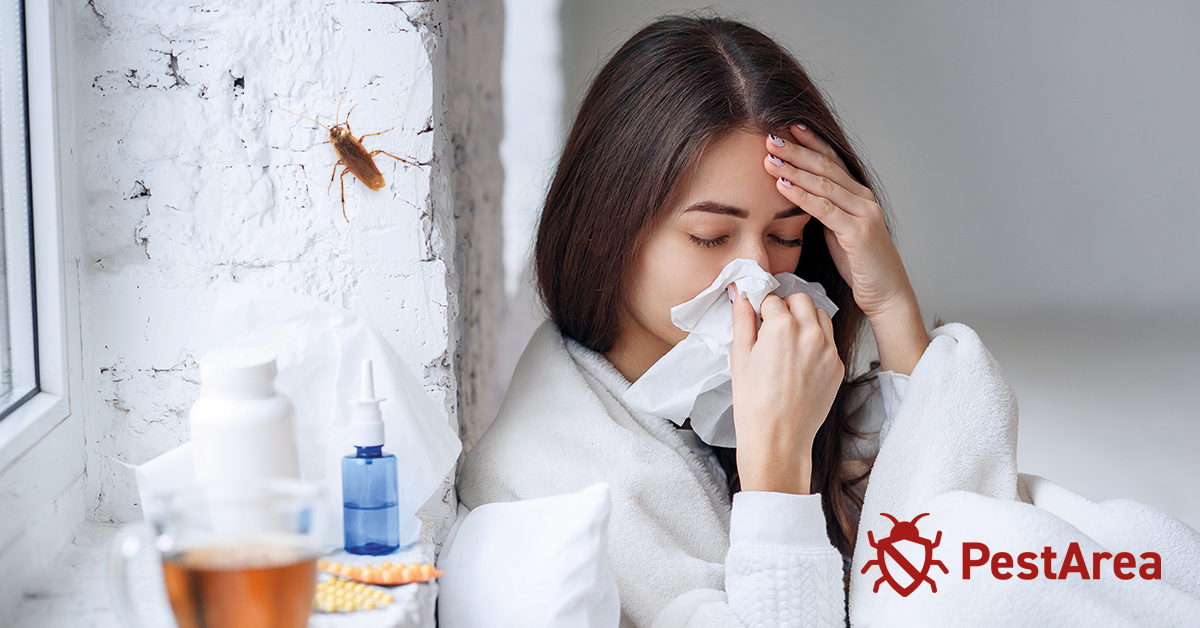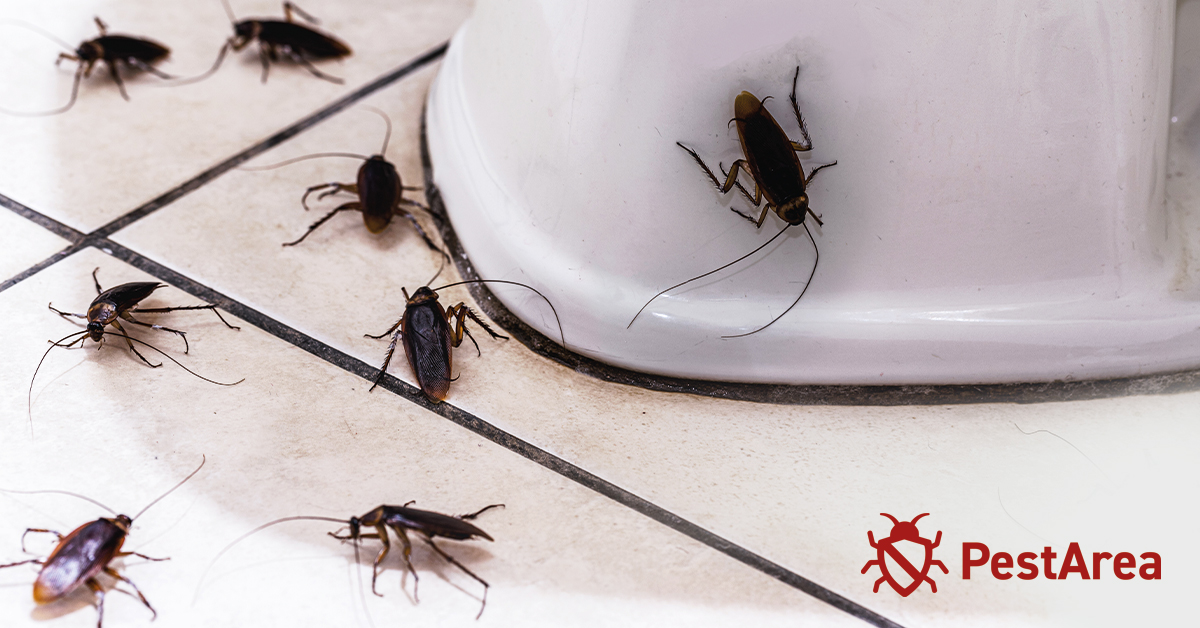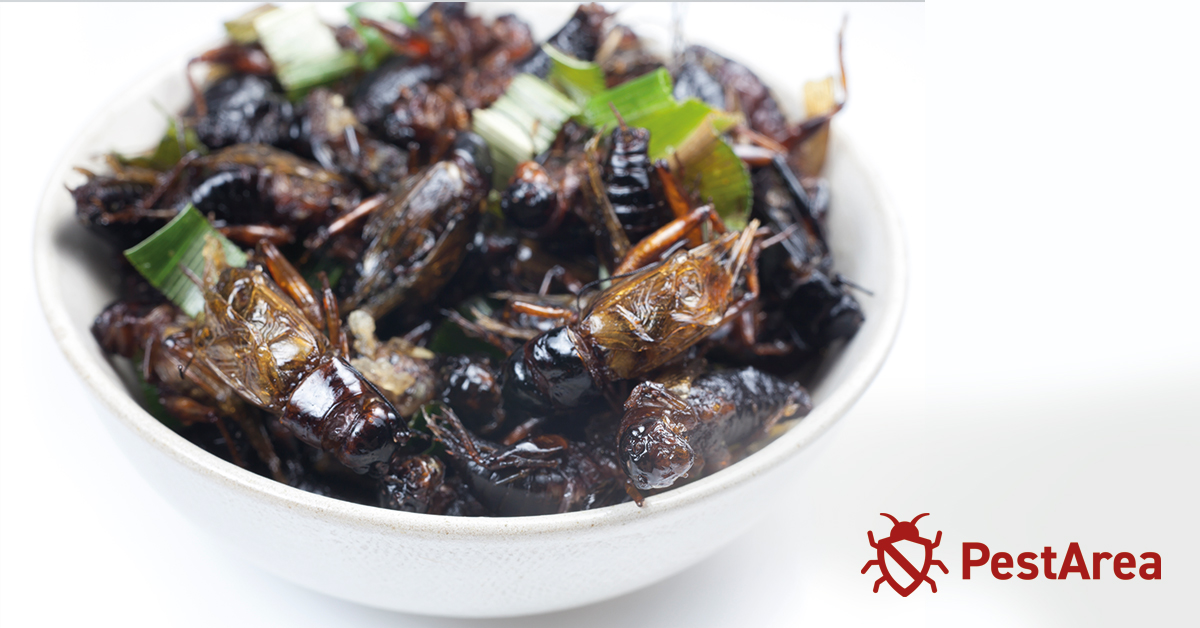 Do you suddenly feel like you’re under the weather without any reason? If so, you might have a cockroach problem. These insects are adept at spreading diseases by puking over food and crawling around the house with germy legs.
Do you suddenly feel like you’re under the weather without any reason? If so, you might have a cockroach problem. These insects are adept at spreading diseases by puking over food and crawling around the house with germy legs.
Throughout their lifetime, cockroaches visit many nasty places, picking up bacteria and harmful microorganisms like Salmonella and E. Coli. When they enter your home, they spread diseases everywhere they go. Disgusting, right?
To stop these nudniks from making you sick, you must follow a few handy tips. This post discusses what diseases roaches carry and how you can prevent them.
Do Roaches Carry Diseases?
 Roaches can carry several diseases as they live in unhygienic environments. These pests feed on trash, feces, decomposing food, and anything organic.
Roaches can carry several diseases as they live in unhygienic environments. These pests feed on trash, feces, decomposing food, and anything organic.
The common intestinal diseases caused by cockroaches are:
- Cholera
- Diarrhea
- Typhoid fever
- Dysentery
- Leprosy
- Poliomyelitis
- Plague
The bugs can also carry many harmful bacteria, molds, fungi, viruses, and parasitic worms, including:
- Campylobacter
- Salmonella
- E. coli
- Listeria
- Staphylococcus faecalis
- Staphylococcus aureus
- Shigella dysenteriae
- Giardia
Cockroaches can not directly transmit these diseases to humans through bites like fleas, mosquitoes, and ticks. Yet, they play a significant role in spreading diseases.
How Do Roaches Spread Diseases?
 Roaches can spread diseases in many ways. For instance:
Roaches can spread diseases in many ways. For instance:
Feces
Cockroach droppings can contain several pathogens that transmit diseases. When roaches consume contaminated organic matter like animal feces or decomposing food, many harmful bacteria and microorganisms enter their gut.
These microorganisms can multiply or stay dormant inside a roach’s digestive system. When the bugs poop, they excrete these pathogens and contaminate the food and spaces they crawl on.
Saliva and Vomit
Cockroaches can spread microorganisms through their saliva and vomit. The insects excrete saliva before consuming food. If any food goes undigested, roaches may vomit it.
Thus, they contaminate your food and spread bacteria in all spaces of your home.
Direct Contact
Roaches prefer to dwell in unclean areas that can offer food, shelter, and favorable living conditions. Usually, you can find these bugs thriving in sewers, trash cans, and drains. They may also live in cesspits: places that contain fungi, bacteria, viruses, etc., in abundance.
When cockroaches crawl and hide in these areas, microorganisms cling to their spiny legs.
Roaches have legs with large surface areas. As a result, they can easily spread hundreds of pathogens when crawling over your cushions, tables, and kitchen counters.
How Do Roaches Make You Sick?
 Cockroaches can make you sick in many ways. Their infestations can cause disease transmissions and health issues. Most of these diseases are acquired by:
Cockroaches can make you sick in many ways. Their infestations can cause disease transmissions and health issues. Most of these diseases are acquired by:
Drinking or Eating Contaminated Food
Consuming contaminated food is a common transmission method for diseases spread by roaches. When you drink or eat food contaminated by cockroaches, harmful bacteria and pathogens may enter your body. This can also happen if your food comes in contact with contaminated cooking vessels, utensils, or surfaces,
Inhaling Roach Contaminated Air
Inhaling air contaminated with roach fecal matter, vomit shed skin, or dried saliva can trigger asthma attacks in asthma patients.
Touching Contaminated Household Items
Touching your contaminated household items like books, spoons, etc., can transfer pathogenic diseases. When you hold these objects and touch your nose, mouth, eyes, or open wounds, microorganisms can enter your body and infect you.
Can You Be Allergic to Roaches?
Yes. Many people can be allergic to cockroaches. These bugs contain a protein that can be an allergen for people.
These allergens can enter your body through the saliva, feces, and dead skin particles of roaches spread in the air. When you inhale air contaminated with roach allergens, it can trigger an allergic reaction.
If you suspect a cockroach allergy, you must check yourself for the following symptoms:
- Runny nose
- Sneezing
- Red, itchy, or watery eyes
- Itchy mouth, throat, or nose
- Stuffy nose
- Postnasal drip
- Skin rash or itchy skin
- Cough
Did You Know? Some People Love to Eat Cockroaches
People around the world love to devour cockroaches. Some Quora users shared that eating roaches doesn’t make them sick. So, if you accidentally eat a cockroach, the bug won’t kill you. However, you should avoid eating them frequently.
Roaches can be a high source of protein. In fact, these insects are commercially farmed for protein extraction. The bugs can be a suitable meat alternative for organic protein, athletes, and pet owners.
You can eat roaches by frying them and using a dipping sauce for flavor. The high-temperature frying can kill most pathogens inside the cockroach and make it safer for consumption.
How Can You Keep Roaches from Spreading Diseases?
You can keep roaches from spreading diseases by eliminating their colonies. If there are no bugs, they can’t crawl around your home to spread diseases.
Here are some effective methods to get rid of cockroaches in your home:
Cleaning
Cleaning your home can help you exterminate roaches. It may also help you disinfect the house and remove bacteria. Follow these tips for a squeaky clean home:
- Remove food crumbs by cleaning the floor and work spaces regularly.
- Clean spaces under sinks to remove roach eggs.
- Clean cabinets and remove roach nests.
- Wash cutlery, crockery, and cooking utensils regularly.
- Keep your food covered and wash fruits and vegetables before eating.
Reduce Humidity
Roaches are nocturnal pests and prefer living in dark and damp spaces. These areas can be suitable for offering them food, shelter, water, and warmth. Thus, you should check your home for damn places. For instance, look under your sinks and basement with leaky pipes.
If you find any areas infested with roaches, try fixing the problem to get rid of the bugs.
Hand hygiene
Your hands are a major source of transferring microorganisms into your body. Therefore, you should practice hand hygiene regularly to avoid diseases spread by roaches.
You should wash your hands:
- During, before, and after cooking food
- After using the restroom
- Before eating your meal
- After holding objects that can transfer bacteria or viruses
Seal Roach Entry Points
Cockroaches can enter your home from the tiniest cracks and crevices. Thus, you should seal roach entry points to keep them from spreading diseases.
You can do this by carefully checking your home for cracks and gaps in walls and pipes. Then, use expanding foam to block and seal your leaking drains and cracked walls.
Professional Pest Control
If large roach colonies infest your home, it can be quite a challenge to remove them completely. But you can take professional assistance to exterminate them.
Contact a local pest controller and book a visit. These professionals can evaluate the infestation level in your home and use effective methods to kill cockroaches.
FAQs
How Long Does it Take To Get Sick From Cockroaches?
It can take around 12 – 72 hours to get sick from a cockroach infection. Roaches can transfer Salmonella bacteria which causes salmonellosis. The infection has similar symptoms to food poisoning.
The bugs can accumulate this bacteria by living in the trash and consuming rotten or contaminated food. Roaches can spread this bacteria with their droppings or vomit.
Is Cockroach Poop Poisonous To Humans?
No. Cockroach poop can not be poisonous by itself. However, it can carry many harmful bacteria and microorganisms to cause different diseases. These health problems can range from allergic reactions and asthma to stomach problems.
What To Do if I Find a Roach in My Food?
If you find a cockroach in your food, you should remove the cockroach from your meal. You should also replace your food to avoid consuming harmful pathogens and germs spread by the cockroach.
Conclusion
Cockroaches can make you sick in many ways. For instance, they can:
- Crawl on food, vomit, and defecate to spread diseases
- Trigger asthma
- Cause allergic reactions
You can prevent roach spread diseases if you clean your home regularly to prevent cockroaches. Also, ensure to clean the utensils and food before cooking meals.
